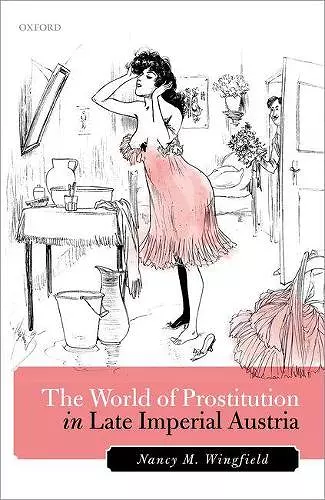The World of Prostitution in Late Imperial Austria
Format:Hardback
Publisher:Oxford University Press
Published:6th Jul '17
Currently unavailable, and unfortunately no date known when it will be back

This study of prostitution addresses issues of female agency and experience, as well as contemporary fears about sexual coercion and the forced movement of girls/women, and police surveillance. Rather than treating prostitutes solely as victims or problems to be solved, as so often has been the case in much of the literature, Nancy M. Wingfield seeks to find the historical subjects behind fin-de-siècle constructions of prostitutes, to restore agency to the women who participated in commercial sex, illuminate their quotidian experiences, and to place these women, some of whom made a rational economic decision to sell their bodies, in the larger social context of late imperial Austria. Wingfield investigates the interactions of both registered and clandestine prostitutes with the vice police and other supervisory agents, including physicians and court officials, as well as with the inhabitants of these women's world, including brothel clients and madams, and pimps, rather than focusing top-down on the state-constructed apparatus of surveillance. Close reading of a broad range of primary and secondary sources shows that some prostitutes in late imperial Austria took control over their own fates, at least as much as other working-class women, in the last decades before the end of the Monarchy. And after 1918, bureaucratic transition did not necessarily parallel political transition. Thus, there was no dramatic change in the regulation of prostitution in the successor states. Legislation, which changed regulation only piecemeal after the war, often continued to incorporate forms of control, reflecting continuity in attitudes about women's sexuality.
Wingfield's study of prostitution in late imperial Austria is a welcome and valuable addition to the growing number of books on the subject within other parts of Europe. It will prove to be of great value and insight to scholars and students of what has often been claimed to be the oldest profession in history. * Alfred Thomas, Sehepunkte *
Nancy Wingfield details the competing aims of the various groups that injected themselves into the public debate on prostitution ... well researched, based on a trove of recently uncovered primary sources * Charles H. Hammond, Jr., Journal of Austrian Studies *
Nancy M.Wingfield's new book, The World of Prostitution in Late Imperial Austria, takes on a difficult subject with discipline and verve. * Britta McEwen, Journal of Modern History *
Wingfield's new book reveals that world to us in a sweeping way. It adds to the library of work on European prostitution and its regulation and contributes something to Austrian history in particular that we simply have not had before. ... it should be of special interest to readers of this Yearbook, including those that have not been engaged with the history of prostitution or sexuality before. * Scott Spector, Austrian History Yearbook *
Wingfield's seminal study is a major contrbution to the historiography of fin-de-siecle Central Europe that cannot be ignored by those interested in the history of sexuality in general and of prostitution in particular. * Lutz D.H. Sauerteig, History *
The World of Prostitution draws many fascinating, and at times, unexpected conclusions. Although Wingfield's monograph focusses on late imperial Austria, her approach opens up exciting new possibilities for scholars working across geopolitical contexts and time periods ... Wingfield's book raises complex questions that continue to divide present-day debates over appropriate legal frameworks for prostitution ... But maybe most importantly, Wingfield's commitment to excavating historical sex workers' physical traces across divergent institutional contexts and discursive practices serves as a reminder that prostitution is not a category but a lived experience in the first instance. * Sabine Wieber, Cultural and Social History *
groundbreaking and innovative study * Centre for Austrian Studies prize committee *
a work that will reshape the way scholars view late imperial Austrian society and culture... It is difficult to suggest improvements to this meticulously researched, engagingly written book * Cynthia Paces, Austrian Studies Newsmagazine *
Wingfield's colorful narrative of the trial and the media frenzy it generated is a window into contemporary views about prostitution and its regulation shows remarkable range. . . in its coverage. * Anita Kurimay, Hungarian Historical Review *
a worthy entry in this tradition, an exemplary piece of scholarship that combines history from above and below in significant, often unanticipated ways. * Katherine Arens, Journal of the History of Sexuality *
a thoroughly researched and densely sourced account of sex work in Cisleithania (the "Austrian" half of the Austro-Hungarian Empire, on "this" side of the Leitha River) from the mid-1880s to the end of the First World War. The specific historical details of the cultural and societal attitudes toward prostitution are fascinating in and of themselves; the many points of comparison to early twenty-first-century debates about sex work make this study particularly exciting ... Wingfield's account is lively and full of fascinating details, incidents, and case studies. * Robert Deam Tobin, H-Net *
Wingfield's book is an important and impressive piece of scholarship that offers an intriguing glimpse into a world that, despite its alleged deviancy, was not only ordinary, but also a central pillar of Habsburg life. * Katya Motyl, German History *
- Winner of Winner of the Center for Austrian Studies 2018 Book Award.
ISBN: 9780198801658
Dimensions: 242mm x 162mm x 22mm
Weight: 452g
290 pages